- Home
- James A. Michener
The Bridges at Toko-Ri: A Novel
The Bridges at Toko-Ri: A Novel Read online
The Bridges at Toko-Ri is a work of historical fiction. Apart from the well-known actual people, events, and locales that figure in the narrative, all names, characters, places, and incidents are the products of the author’s imagination or are used fictitiously. Any resemblance to current events or locales, or to living persons, is entirely coincidental.
2014 Dial Press Trade Paperback Edition
Copyright © 1953 by James Michener
All rights reserved.
Published in the United States by Dial Press Trade Paperbacks, an imprint of Random House, a division of Random House LLC, a Penguin Random House Company, New York.
DIAL PRESS and the HOUSE colophon are registered trademarks of Random House LLC.
Originally published in hardcover in the United States by Random House, an imprint and division of Random House LLC, in 1953.
eBook ISBN 978-0-8041-5147-4
www.dialpress.com
v3.1
To MARSHALL U. BEEBE
Jet Pilot
Contents
Cover
Title Page
Copyright
Dedication
SEA
LAND
SKY
Other Books by This Author
About the Author
SEA
THE SEA was bitter cold. From the vast empty plains of Siberia howling winds roared down to lash the mountains of Korea, where American soldiers lost on patrol froze into stiff and awkward forms. Then with furious intensity the arctic wind swept out to sea, freezing even the salt spray that leaped into the air from crests of falling waves.
Through these turbulent seas, not far from the trenches of Korea, plowed a considerable formation of American warships. A battleship and two cruisers, accompanied by fourteen destroyers to shield against Russian submarines, held steady course as their icy decks rose and fell and shivered in the gale. They were the ships of Task Force 77 and they had been sent to destroy the communist-held bridges at Toko-ri.
Toward the center of this powerful assembly rode two fast carriers, the cause of the task force and its mighty arm. Their massive decks pitched at crazy angles, which for the present made take-offs or landings impossible. Their planes stood useless, huddled together in the wind, lashed down by steel cables.
It was strange, and in some perverse way resolutely American, that these two carriers wallowing in the dusk bore names which memorialized not stirring victories but humiliating defeats, as if by thus publishing her indifference to catastrophe and her willingness to surmount it, the United States were defying her enemies. To the east, and farther out to sea, rode the Hornet, whose predecessor of that name had absorbed a multitude of Japanese bombs and torpedoes, going down off Guadalcanal, while the inboard carrier, the Savo, would forever remind the navy of its most shameful defeat in history, when four cruisers sank helpless at Savo Island, caught sleeping by the audacious Japanese.
Now, as night approached the freezing task force, the bull horn on the Savo rasped out, “Prepare to launch aircraft!” And it was obvious from the way her deck was arranged that the carrier already had some planes in the skies over Korea, and every man who watched the heaving sea wondered how those planes could possibly get back aboard.
The bull horn, ignoring such problems, roared, “Prepare to launch helicopter!” and although the deck pitched in abandon, rotors began to turn, slowly at first and then with lumbering speed.
Now the great carrier struck a sea trough and slid away, her deck lurching, but relentlessly the bull horn cried, “Move jets into position for launching,” and the catapult crew, fighting for footing on the sliding deck, sprang swiftly into action, inching two heavy Banshees onto the catapults, taking painful care not to allow the jets to get rolling, lest they plunge overboard with some sudden shifting of the deck.
“Start jet engines,” roared the insistent bull horn.
The doctor, who had to be on deck in case of crash, looked at the heaving sea and yelled to the crane operator, “They may launch these jets, but they’ll never get ’em back aboard.”
The craneman looked down from his giant machine, which could lift a burning plane and toss it into the sea, and shouted, “Maybe they’re planning to spend the night at some air force field in Korea. Along with the ones that are already up.”
But at this instant all ships of the task force swung in tight circles and headed away from the open sea, straight for the nearby cliffs of Korea, and when the turn was completed, the deck of the Savo mysteriously stabilized. The effects of wind and sea neutralized each other, and planes returning from the bombardment of Korea now had a safe place to land.
But before they could do so the bull horn cried eerily into the dusk, “Launch helicopter!” and the crazy bird, its two rotors spinning so slowly the blades could be seen, stumbled into the air, and the horn cried, “Launch jets!”
Then, as the great carrier rode serenely amid the storms, the catapult officer whirled one finger above his head and a tremendous, almost unbearable roar arose and twin blasts of heat leaped from each Banshee, burning the icy air more than a hundred feet aft. Now the officer whirled two fingers and the roar increased and white heat scorched the deck of the carrier and the twin engines whipped to a meaningless speed of 13,000 revolutions a minute and the Banshee pilot, forcing his head back against a cushion, saluted and the catapult officer’s right hand whipped down and the catapult fired.
Nine tons of jet aircraft were swept down the deck at a speed of more than 135 miles an hour. Within less than 150 feet the immense Banshee was airborne, and by the time it reached the forward edge of the carrier, it was headed toward its mission. Four times the catapults fired and four times heavy jets leaped into the darkening sky and headed for the coastline of Korea.
As soon as they had left, the bull horn wailed, “Respot planes. On the double. We must recover the Korean jets immediately.”
When this announcement was made thirty old-fashioned propeller planes were already lashed down on the after part of the flight deck in precisely that area needed for landing the jets which now appeared overhead. The prop planes had been stowed there to permit catapult take-offs, and now they must be moved forward. So on the wooden deck, swept by icy winds, hundreds of young men in varicolored uniforms sped to the task of clearing the landing space. Men in green stowed the catapult gear so that no remnant of the powerful machine was visible. Other men in yellow leaped upon the deck and began to indicate the course each plane must follow on its way to forward stowage. Dozens of tough young men in blue leaned their shoulders against the planes, swung them laboriously into position and pushed them slowly into the biting wind. In blazing red uniforms other men checked guns or fueled empty craft while plane captains in brown sat in cockpits and worked the brakes to prevent accident. Darting about through the milling, pushing, shouting deck hands three-wheeled jeeps of vivid yellow and lumbering tractors in somber gray hurried to their jobs, while over all towered the mighty arms of the enormous black and sinister crane. Behind it lurked two weird men in fantastic suits of ashen gray asbestos, their faces peering from huge glassine boxes, ready to save the pilot if a crashed plane should burn, while in back of them, clothed in snowy white, the doctor waited, for death was always close upon the carrier deck.
So in an age of flight, in the jet age of incredible speed, these men pushed and pulled and slipped upon the icy deck and ordered the heavy planes with their bare hands. Upon trailing edges burdened with ice they pushed, their faces open to the freezing wind, their eyes heavy with frozen salt and the knuckles of their hands covered long since with protecting scars. And as they moved, their bright colors formed the pattern of a dance and after they had s
warmed upon the deck for some minutes the Savo was transformed and from the lowering shadows the jets prepared to land.
This intricate operation was guided by one man. From the admiral’s country he had directed the task force to run toward the communist coast. The last four jets had been dispatched at his command. He had placed the ships so that the operations of one would not trespass the allotted space of the other, and it was his responsibility to see that his carriers faced the wind in such position that smoke trailed off to one side rather than directly aft and into the faces of incoming pilots. Now he stood upon his bridge and watched the mountains of Korea moving perilously close.
Admiral George Tarrant was a tall narrow man with a sharp face that was sour and withdrawing like those of his Maine ancestors. Battlewizened, he had fought the Japanese with his own carrier at Saipan, at Iwo Jima and at Okinawa, where his austere and lonely presence had brought almost as much terror to his own fliers as it had to the enemy.
He was known through the navy as George the Tyrant, and any aviator who wanted to fetch a big laugh would grab a saucer in his left hand, a coffee cup in his right, lean back in his chair and survey the audience sourly, snorting, “Rubbish.” Then the mimic would stare piercingly at some one pilot, jab the coffee cup at him and growl, “You, son. What do you think?”
But men who served with Tarrant soon forgot his tyranny and remembered his fantastic skill in operating a task force. His men said flatly, “He can do it better than anyone else in the world.” He knew the motion of the sea and could estimate whether a morning swell would rise to prevent recovery of afternoon planes or subside so that even jets could land freely. He was able to guess when new gales of bitter Siberian air would rush the line of snowstorms out to sea and when the snow would come creeping softly back and throw a blizzard about the task force as it slept at night. And he had a most curious ability to foresee what might trouble the tin-can sailors serving in the remote destroyers.
He fought upon the surface of the sea and in the sky. He sent his planes inland to support ground troops or far out to sea to spot Russian submarines. His was the most complex combat command of which one man’s mind was capable and on him alone depended decisions of the gravest moment.
For example, the position he was now in, with mountains closing down upon him, was his responsibility. Early that morning his aerologist had warned, “Wind’s coming up, sir. You might run out of ocean by late afternoon.”
He studied the charts and growled, “We’ll make it.”
Now his navigator warned, “We can’t hold this course more than sixteen minutes, sir.” The young officer looked at the looming coastline as if to add, “After that we’ll have to turn back and abandon the planes.”
“We’ll make it,” Tarrant grumbled as his ships plowed resolutely on toward the crucial hundred fathom curve which he dare not penetrate for fear of shoals, mines and submarines. But he turned his back upon his problem, for he could do nothing about it now. Instead, he checked to be sure the Savo’s deck was ready and in doing so he saw something which reassured him. Far aft, standing upon a tiny platform that jutted out over the side of the carrier, stood a hulking giant, muffled in fur and holding two landing-signal paddles in his huge hands. It was Beer Barrel, and if any man could bring jets surely and swiftly home, it was Beer Barrel.
He was an enormous man, six feet three, more than 250 pounds, and his heavy suit, stitched with strips of fluorescent cloth to make his arms and legs easier to read, added to his bulk. He was a farmer from Texas who before the perilous days of 1943 had never seen the ocean, but he possessed a fabulous ability to sense the motion of the sea and what position the carrier deck would take. He could judge the speed of jets as they whirled down upon him, but most of all he could imagine himself in the cockpit of every incoming plane and he seemed to know what tired and jittery pilots would do next and he saved their lives. He was a fearfully bad naval officer and in some ways a disgrace to his uniform, but everyone felt better when he came aboard a carrier, for he could do one thing. He could land planes.
He could reach out with his great hands and bring them safely home the way falconers used to bring back birds they loved. In the Pentagon they knew he broke rules and smuggled beer aboard each ship he served upon. Carrier captains knew it, and even Admiral Tarrant, who was a terror on navy rules, looked the other way when Beer Barrel staggered back after each drunken liberty, lugging his two ridiculous golf bags. The huge Texan had never once played golf and the two clubs sticking out were dummies. Once a deck hand, fearful that drunken Beer Barrel might slide back down the gangplank, had grabbed one of the outsize golf bags to help, but the surprising weight of it had crumpled him to the deck. Beer Barrel, barely able to heft the bag himself, had got it onto his massive shoulder, whispering beerily to the boy, “Thanks, Junior, but this is man’s work.” And he had carried the bags full of beer into his quarters.
For he believed that if he had a can of cold beer in his belly it formed a kind of gyroscope which made him unusually sensitive to the sea and that when this beer sloshed about it harmonized with the elements and he became one with the sea and the sky and the heaving deck and the heart of the incoming pilot.
“Land jets!” moaned the bull horn.
“Let’s hear the checks,” Beer Barrel said to his spotters, staring aft to catch the first jet as it made its 180° turn for the cross leg and the sharp final turn into the landing run. Now the jet appeared and Beer Barrel thought, “They’re always pretty comin’ home at night.”
“All down!” the first watcher cried as he checked the wheels, the flaps and the stout hook which now dangled lower than the wheels.
“All down,” Beer Barrel echoed unemotionally.
“Clear deck!” the second watcher shouted as he checked the nylon barriers and the thirteen heavy steel wires riding a few inches off the deck, waiting to engage the hook.
“Clear deck,” Beer Barrel grunted phlegmatically.
He extended his paddles out sideways from his shoulders, standing like an imperturbable rock, and willed the plane onto the deck. “Come on, Junior,” he growled. “Keep your nose up so’s your hook’ll catch. Good boy!” Satisfied that all was well, he snapped his right paddle dramatically across his heart and dropped his left arm as if it had been severed clean away from his body. Instantly the jet pilot cut his flaming speed and slammed his Banshee onto the deck. With violent grasp the protruding hook engaged one of the slightly elevated wires and dragged the massive plane to a shuddering stop.
Beer Barrel, watching from his platform, called to the clerk who kept records on each plane, “1593. Junior done real good. Number three wire.” Never did Beer Barrel feel so content, not even when guzzling lager, as when one of his boys caught number three wire. “Heaven,” he explained once, “is where everybody gets number three wire. Hell is where they fly wrong and catch number thirteen and crash into the barrier and burn. And every one of you’s goin’ straight to hell if you don’t follow me better.”
From his own bridge, Admiral Tarrant watched the jets come home. In his life he had seen many fine and stirring things: his wife at the altar, Japanese battleships going down, ducks rising from Virginia marshes and his sons in uniform. But nothing he knew surpassed the sight of Beer Barrel bringing home the jets at dusk.
There always came that exquisite moment of human judgment when one man—a man standing alone on the remotest corner of the ship, lashed by foul wind and storm—had to decide that the jet roaring down upon him could make it. This solitary man had to judge the speed and height and the pitching of the deck and the wallowing of the sea and the oddities of this particular pilot and those additional imponderables that no man can explain. Then, at the last screaming second he had to make his decision and flash it to the pilot. He had only two choices. He could land the plane and risk the life of the pilot and the plane and the ship if he had judged wrong. Or he could wave-off and delay his decision until next time around. But he could defer his job to n
o one. It was his, and if he did judge wrong, carnage on the carrier deck could be fearful. That was why Admiral Tarrant never bothered about the bags of beer.
On they came, the slim and beautiful jets. As they roared upwind the admiral could see their stacks flaming. When they made their far turn and roared downwind he could see the pilots as human beings, tensed up and ready for the landing that was never twice the same. Finally, when these mighty jets hit the deck they weighed well over seven tons and their speed exceeded 135 miles an hour, yet within 120 feet they were completely stopped and this miracle was accomplished in several ways. First, Tarrant kept his carriers headed into the wind, which on this day stormed in at nearly 40 miles an hour, which cut the plane’s relative speed to about 95 miles. Then, too, the carrier was running away from the plane at 11 miles an hour, which further cut the plane’s speed to 84, and it was this actual speed that the wires had to arrest. They did so with brutal strength, but should they miss, two slim nylon barriers waited to drag the plane onto the deck and chop its impetus, halting it so that it could not proceed forward to damage other planes. And finally, should a runaway jet miss both the wires and the barriers, it would plunge into a stout nylon barricade which would entwine itself about the wings and wheels and tear the jet apart as if it were a helpless insect.
But it was Beer Barrel’s job to see that barriers and the barricade were not needed and he would shout curses at his pilots and cry, “Don’t fly the deck, Junior. Don’t fly the sea. Fly me.” An air force colonel watching Beer Barrel land jets exclaimed, “Why, it isn’t a landing at all! It’s a controlled crash.” And the big Texan replied in his beery voice, “Difference is that when I crash ’em they’re safe in the arms of God.”
Now he brought in three more, swiftly and surely, and Admiral Tarrant, watching the looming mountains of Korea as they moved in upon his ships, muttered, “Well, we’ll make it again.”

 Mexico
Mexico The World Is My Home: A Memoir
The World Is My Home: A Memoir Sayonara
Sayonara Chesapeake
Chesapeake The Novel
The Novel Rascals in Paradise
Rascals in Paradise Return to Paradise
Return to Paradise Presidential Lottery: The Reckless Gamble in Our Electoral System
Presidential Lottery: The Reckless Gamble in Our Electoral System The Source
The Source Poland
Poland Space
Space Caravans
Caravans Creatures of the Kingdom: Stories of Animals and Nature
Creatures of the Kingdom: Stories of Animals and Nature Iberia
Iberia Hawaii
Hawaii The Watermen: Selections From Chesapeake
The Watermen: Selections From Chesapeake Report of the County Chairman
Report of the County Chairman The Covenant
The Covenant The Bridges at Toko-ri
The Bridges at Toko-ri Matecumbe
Matecumbe Journey: A Novel
Journey: A Novel Centennial
Centennial Sports in America
Sports in America Texas
Texas Miracle in Seville
Miracle in Seville This Noble Land: My Vision for America
This Noble Land: My Vision for America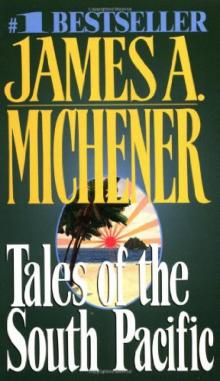 Tales of the South Pacific
Tales of the South Pacific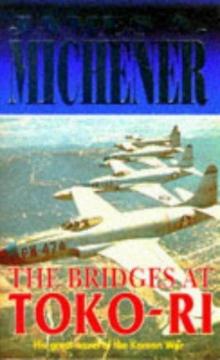 Bridges at Toko-Ri
Bridges at Toko-Ri Space: A Novel
Space: A Novel Presidential Lottery
Presidential Lottery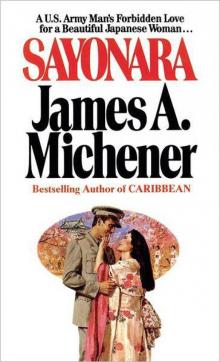 Sayonara: A Novel
Sayonara: A Novel This Noble Land
This Noble Land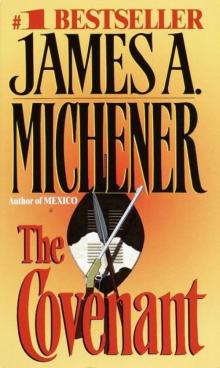 The Covenant: A Novel
The Covenant: A Novel Miracle in Seville: A Novel
Miracle in Seville: A Novel The Bridge at Andau
The Bridge at Andau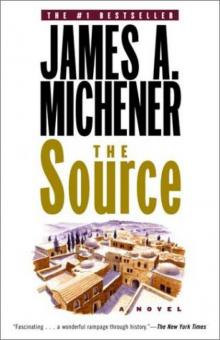 Source
Source The Source: A Novel
The Source: A Novel Journey
Journey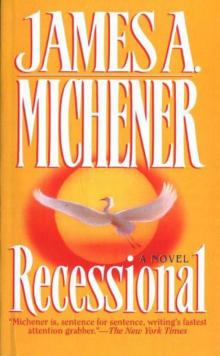 Recessional: A Novel
Recessional: A Novel Legacy: A Novel
Legacy: A Novel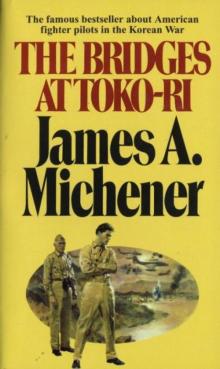 The Bridges at Toko-Ri: A Novel
The Bridges at Toko-Ri: A Novel Poland: A Novel
Poland: A Novel